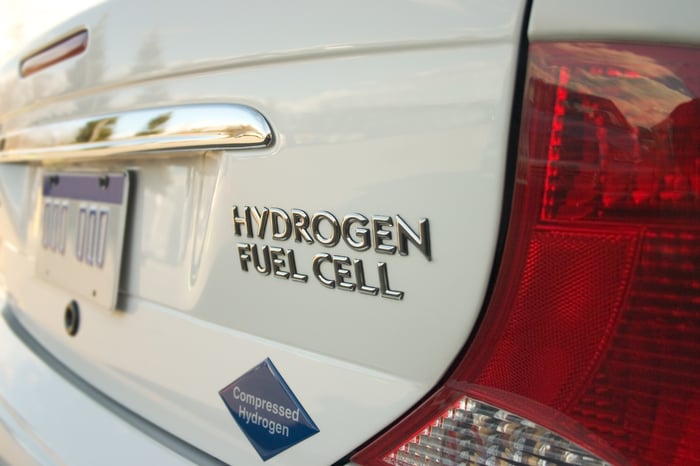2020 was an eventful year for the stock market. It gave us the fastest bear market crash in history, a brief turn negative for West Texas Intermediate crude oil futures, and an all-time high for the CBOE Volatility Index in March.
Despite this record-breaking chaos, millennial and novice investors were unfazed. Online investing app Robinhood, which has an average user age of only 31, gained approximately 3 million new users in 2020.
However, Robinhood investors have also developed quite the reputation on Wall Street for chasing momentum, no matter how pricey a company was perceived to be. In recent weeks, the following three bubble stocks have lured Robinhood investors.

Image source: Getty Images.
NIO
Arguably the most hyped-up stock on Robinhood is electric-vehicle (EV) manufacturer NIO (NIO 7.75%). Once an afterthought, NIO is now the third most held stock on the entire platform. It's worth noting that NIO keeps rising the ranks of Robinhood's leaderboard despite a nearly 1,600% return over the trailing year through Jan. 13.
This overwhelming interest in NIO primarily ties into the mammoth long-term potential of EVs in China. By 2035, approximately half of all vehicles sold in the largest auto market in the world will be alternative energy. Since NIO is based in China, it potentially offers geographic first-mover advantages.
Additionally, NIO's production has begun expanding at a rapid pace. NIO delivered 43,728 vehicles in 2020, but was on track for an annual run-rate of 84,000 EVs as of December. NIO's management has previously said that hitting an annual run-rate of 150,000 vehicles will be key in 2021.
The company also made waves with the introduction of its battery-as-a-service (BaaS) program in August. BaaS program enrollees pay a monthly membership fee in exchange for a lower initial vehicle cost and the ability to replace/upgrade their EV's batteries at a later date. This concept should help boost initial sales, create a steady stream of high-margin residual cash flow, and improve long-term customer loyalty.
While this probably all sounds great, Robinhood investors seem to have overlooked that NIO is a $97 billion company that's only produced a little over 75,000 total EVs since its inception. It's also, at minimum, two years away from having a chance to turn the corner to profitability.
What's more, auto stock operating margins are nothing to write home about. Whether we're talking about combustion-engine vehicles or EVs, the auto industry is capital-intensive and yields mediocre margins, at best. Robinhood investors are probably going to regret paying $97 billion for a still-nascent automaker.

Image source: Getty Images.
Sundial Growers
When I say "bubble stock," you probably think of a company that's ascended to jaw-dropping heights, like NIO. But the term can also be applied to beaten-down stocks that have rallied strongly off of their lows without much reasoning. That's why Canadian marijuana stock Sundial Growers (SNDL 4.62%) makes the list.
At $0.66 a share, Sundial is every bit a penny stock. But since quadrupling from its late-October lows, Sundial has worked its way up to the No. 18 spot on Robinhood's most-held stocks, and it now has a market cap of more than $680 million.
The recent buzz about Sundial mostly has to do with the election results in the United States. President-elect Joe Biden's win in November and the two Democratic victories in the Georgia Senate runoffs in early January open the door for Congress to potentially legalize marijuana at the federal level. Keep in mind that an all-time record 68% of survey-takers in Gallup's 2020 cannabis poll supported nationwide legalization.
There's also excitement about Sundial Growers addressing its debt and bolstering its cash position. Unfortunately, this positive is also one of the company's most blatant negatives. To pay down debt and raise capital, Sundial has sold shares of its stock and converted some of its debt to equity. In plainer terms, the company's outstanding share count has ballooned higher, crushing the per-share value of its stock.
Sundial Growers happens to be in the midst of an operational shift, too. Until recently, it was devoted to selling low-margin wholesale cannabis. It's in the process of shifting its focus to retail pot sales, but is producing some ugly year-over-year comps as it transitions. Net sales in the September-ended quarter were more than halved from the prior-year period.
The point is, Sundial is nowhere near recurring profitability, and the company has shown little regard for its shareholders. It's time for Robinhood investors to move their money elsewhere in the cannabis space.

Image source: Getty Images.
Plug Power
Lastly, Robinhood investors are definitely being a bit bubbly by chasing after hydrogen fuel-cell solutions company Plug Power (PLUG 1.26%). Just like NIO, Plug Power has skyrocketed by 1,600% over the trailing year.
Plug Power is on fire for a number of reasons. For starters, investors are clearly excited about alternative energy solutions, especially with climate concerns growing. The incoming administration in the U.S. is expected to promote renewable energy options, which very well could include hydrogen fuel cells.
Second, the company's big warrant bet back in 2017 appears to be paying off. Plug Power offered warrants to Amazon and Walmart, with the condition that they'll vest based on the amount of hydrogen technology orders placed. Given Plug's soaring share price, Amazon and Walmart now have extra incentive to purchase GenDrive-powered forklifts.
Third, Plug Power has landed two very big deals early in 2021. On Jan. 6, South Korea's SK Group took a 10% stake in the company worth $1.5 billion at the time. This strategic partnership is intended to develop and roll out hydrogen fuel cell technology in vehicles in South Korea. Not even a week later, Plug signed a memorandum of understanding with French automaker Renault to create a 50-50 joint venture targeting significant fuel-cell share in Europe's light commercial vehicle market.
There's no question that these are big steps forward for Plug Power. Then again, we're talking about a company that hasn't demonstrated the ability to generate a recurring profit in over two decades as a public company. Even for aggressive growth investors, 73 times Wall Street's projected sales in 2021 is probably over the top.
It's also unclear how seamless hydrogen fuel cell adoption will be in South Korea and Europe. I expect these joint ventures will encounter unforeseen challenges that aren't yet reflected in the company's nearly $33 billion market cap.





